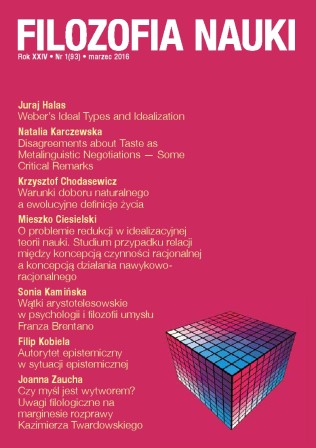Warunki doboru naturalnego a ewolucyjne definicje życia
The Conditions of Natural Selection and Evolutionary Definitions of Life
Author(s): Krzysztof ChodasewiczSubject(s): Philosophy, Philosophy of Science
Published by: Uniwersytet Warszawski - Wydział Filozofii i Socjologii, Instytut Filozofii
Keywords: natural selection; classical requirements for natural selection; replicator-interactor conception of natural selection; non-classical (non-standard) approach to natural selection; definition of life
Summary/Abstract: The aim of this paper is to provide an analysis which connects the discussion about the definition of life with the discussion about the requirements for evolution by natural selection. One of the most popular definitions of life is the so-called Darwinian definition, according to which “life is a self-sustained chemical system capable of undergoing Darwinian evolution” (Joyce 1994: xi). It is an example of a broader family of evolutionary definitions. The problem of defining life causes a lot of controversy. Still, the fundamental requirements for natural selection are also a subject of discussion. This implies that different formulations of basic conditions for natural selection are relevant for defining life. In other words, a given formulation of basic conditions for selection will result in a different classification of phenomena (as living or not) by the Darwinian or other evolutionary definition. The basic conditions for selection can also be important for some operational and other methodological aspects of the definition of life. In this paper, I analyse the classical approach to natural selection (represented by Lewontin, Endler, and Maynard Smith), the replicator-interactor framework for selection (put forward by Dawkins and Hull), and “non-classical” approaches for selection (represented by Bourrat, Bouchard, and Gecow). Godfrey-Smith’s “antiessentialist” conception of Darwinian space is also taken into account. Finally, I argue that although Bourrat’s approach seems to have very interesting implications for defining life, it cannot (at this stage) replace the classical formulation as the best basis for the Darwinian definition of life.
Journal: Filozofia Nauki
- Issue Year: 24/2016
- Issue No: 1 (93)
- Page Range: 41-73
- Page Count: 33
- Language: Polish

